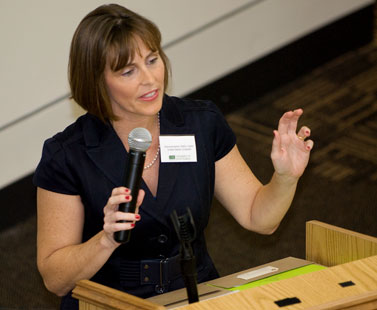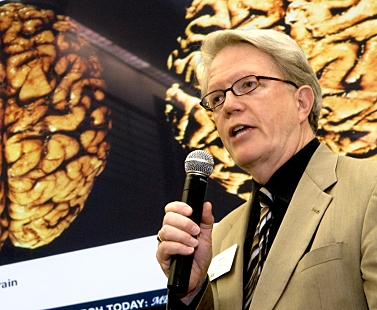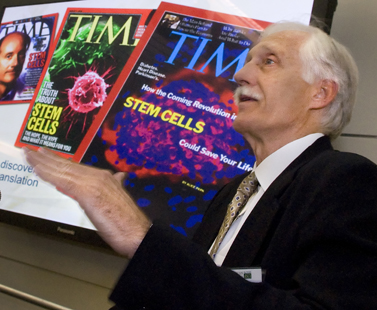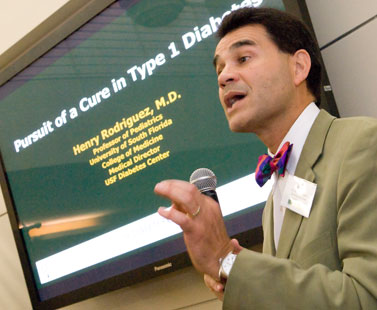Research Means Hope: Fighting Killing Diseases

The video was no less chilling for showing a villain that was faceless and silent.
The malaria parasite may be tiny, but it kills close to a million people a year.
At the “Research Means Hope” event Tuesday, researcher Michael W. White, PhD, played a video showing the relentless march of the malaria parasite as it moved through the bloodstream, wreaking destruction as it replicated.
“It’s only by this kind of activity, by staying a step ahead of the parasites, will we be able to eradicate malaria,” said Dr. White, professor of molecular medicine.
Dr. White was one of four researchers who spoke at Tuesday’s event, designed to highlight the critical importance of medical research in the struggle against disease and suffering. The event is part of the university’s campus-wide Research One celebration, which continues all week.

“What ‘Research Means Hope’ stands for is one university, one community, one vision,” said Dr. Stephen Klasko, dean of the USF College of Medicine and CEO of USF Health. “What it’s really about, and the people you’re going to be hearing from, are people who make a difference.
“Making new scientific discoveries is part of the economic engine of any university,” Dr. Klasko said. “It’s part of the lifeblood of any university. But hopefully, what you see is that it’s more than that. Really, what we’re doing is providing hope. Real hope for people with diseases who might not have had that before.”

U.S. Rep. Kathy Castor attended the event and praised USF for its rapid growth as a research university. USF was the nation’s fastest growing university in federal research expenditures from 2000 to 2007. And the Chronicle of Higher Education recently reported that in 2009, USF ranked 57th for federal research and development expenditures.
“The University of South Florida is young – it’s just a baby. And yet it is the cream of the crop,” Castor said. “Every day, researchers here are on the cutting edge of new innovations, discovery and fighting disease, in the community and all across the globe.”

Mark Huey, economic and urban development administrator for the city of Tampa, said USF Health’s growth as a research hub has made it a key part of Tampa Bay’s economy.
“This university, and the hundreds of businesses that have developed over the past decade that are somehow attached to the research or work of this university – that is a fulcrum of job creation for our community,” Huey said. “That would not have been the case 10 years ago.”
Huey brought with him a city proclamation naming Tuesday as “Research Means Hope Day” for Tampa.
The researchers Tuesday each highlighted work to learn more about a different disease:

*Finding more effective treatments for Alzheimer’s disease was the focus for Huntington Potter, PhD, professor of molecular medicine at the USF Health Byrd Alzheimer’s Institute. Dr. Potter and colleagues have found that a protein produced by rheumatoid arthritis patients reduces the signs and symptoms of Alzheimer’s in mice.

*The potential for using adult stem cells to treat heart disease was discussed by one of USF Health’s newest faculty members, Leslie Miller, MD, professor and chief of cardiovascular sciences. Dr. Miller is the new chair of cardiology and holds the Edward C. Wright Chair of Cardiovascular Medicine.

*Seeking a cure for Type 1 diabetes is the research focus for another new faculty member, Henry Rodriguez, MD, pediatrics professor and clinical director of the USF Diabetes Center.
*Finally, developing drugs to fight infectious diseases, such as malaria, was discussed by Dr. White. Dr. White is working to identify proteins in malaria that are essential to the parasite’s replication. Finding a drug to destroy or deactivate the protein could stop the parasite in its tracks.
— Story by Lisa Greene, photos by Eric Younghans, USF Health Communications

